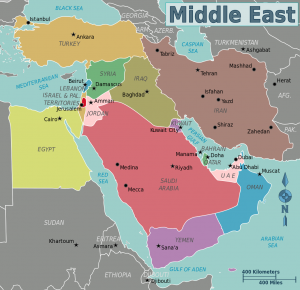Arne Lietz, member of European Parliament, explains why contributing to the peace process in the ME is a core foreign policy issue for the EU…

(c) European Union 2016
The peace process in the Middle East is a core issue for European foreign affairs. The EU is Israel’s main trade partner and one of the major contributors to humanitarian aid in the region. U.S. President Donald Trump’s decision to move the U.S. embassy to Jerusalem – a decision which was rightly broadly criticized by the international community – has fuelled further violence in Gaza. Since then, the EU has been increasingly vocal on its position regarding a peace process between Israel and Palestine. This has, however, not led to meaningful progress in the process. On the contrary; the EU and its Member States have been observing with growing worry how the situation has become more and more critical over the past two years.
Donald Trump’s decision to withdraw existential funding of humanitarian aid to Palestinians through UNRWA has increased the risk of further destabilizing the situation. Even Israeli voices, such as leading representatives of the military, have criticized this approach as they, too, see the devastating effect it has had on the living conditions of Palestinian refugees and the stability of the status quo. I am glad to have reached a broad cross-party consensus in the European Parliament while negotiating a resolution in February 2018, condemning the U.S. decision and calling on Member States to fast-track and increase their funding for UNWRA in order to ensure continuous aid to Palestinian refugees.
Whilst Israel’s right to exist lies at the core of the EU’s approach to a future peace process, so does the concept of a two-state solution. Recent developments have shown that we need a much stronger push for political reconciliation between Israel and Palestine if peace in the Middle East is to be achieved. The EU should take a strong stance toward Israel with regards to compliance with international law. This would include impartial investigations of the violence and killings in the Gaza strip over the past few weeks, as well as the re-admission of humanitarian aid to the region. This has to be the first priority and is supported by a European Parliament resolution passed on April 18, 2018.

Cacahuate / Wikimedia / (CC BY-SA 4.0 / https://creativecommons.org/licenses/by-sa/4.0/
In 2015, the EU made essential contributions to the conclusion of the Iran deal, an agreement which to this day is a guarantor for stability and peace in the region. The U.S. announcement to leave the deal has led to tensions and insecurity in the region. A second priority for the EU’s engagement in the Middle East peace process should therefore be to make use of all diplomatic tools available in order to maintain the Iran deal. European policy makers and Member States should make it very clear to their U.S. counterparts that leaving the Iran deal will have severe consequences for transatlantic relations, and that repercussions are difficult to foresee.
During visits to Berlin, Paris, and London in June 2018, Israeli Prime Minister Benjamin Netanyahu has met with European leaders who were consistent in their response to Israel’s approach to the potential cancellation of the Iran deal. All of them have called for the deal to remain in place and have reminded Netanyahu how crucial it is to the region’s stability, displaying coherence with the European position in their bilateral relations.
For the European voice to be heard continuously on the global stage in the negotiations on peace in the Middle East, it has to be a strong, unified voice. The third priority for the EU’s contribution to peace in the Middle East to this end includes the Member States’ commitment to the EU’s foreign affairs agenda, and avoiding single-handed strategies by individual Member States or breaking with the EU’s common policy line in the
Middle East.
This is of equal importance regarding the war in Syria. The EU has proven to be an efficient and inclusive driver of multilateral negotiations in the past. It should continue to live up to this role by reinforcing its efforts to get the different parties involved back to the negotiation table in Geneva. A political solution is the only way peace can be reintroduced to the country – this is even more essential since the war has exceeded national interest versus the interest of rebellious groups. It has also turned into a war which is supported by many international actors, such as Russia, Iran, Saudi Arabia, Turkey, and Israel, each with their different interests in
the conflict.
At the same time, under the leadership of the United Nations and with the assistance of the European Union’s political forces, the international community has to initiate a process for developing a future for reconstructing Syria. A politically stable Syrian environment will be crucial to peace and security in the whole region.
The Middle East is part of the EU’s wider neighborhood, and is therefore an integral part of the EU’s foreign agenda. I support this agenda which is built on respect for international law, human rights, reconciliation, and political solutions to conflicts as well as building up resilience. The peace process in the Middle East has to be supported with every diplomatic and political tool available to European
policy-makers. ■
Arne Lietz is member of the European Parliament, focusing mainly on Foreign Affairs, Development, Transatlantic Affairs and Security and Defense
